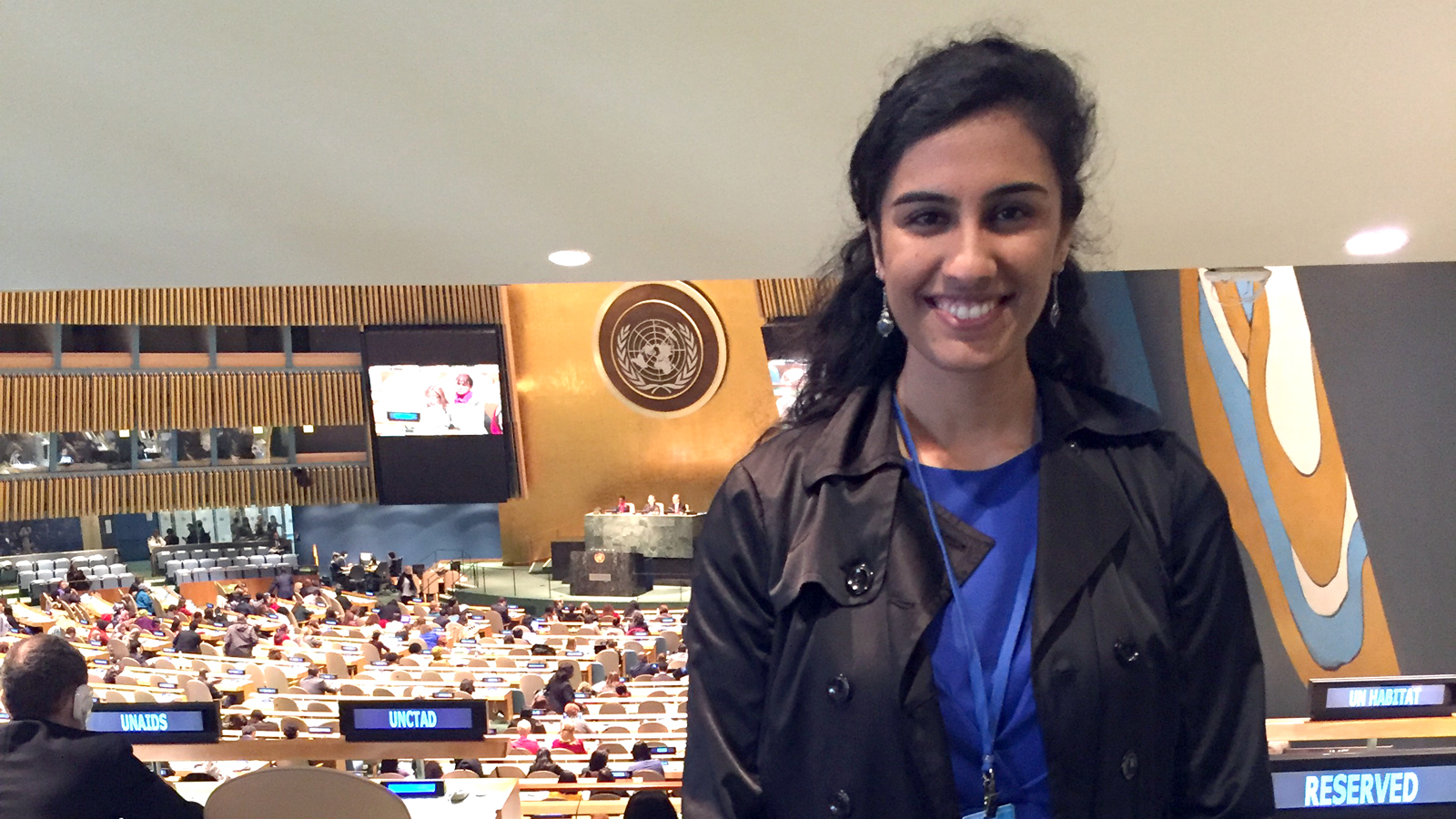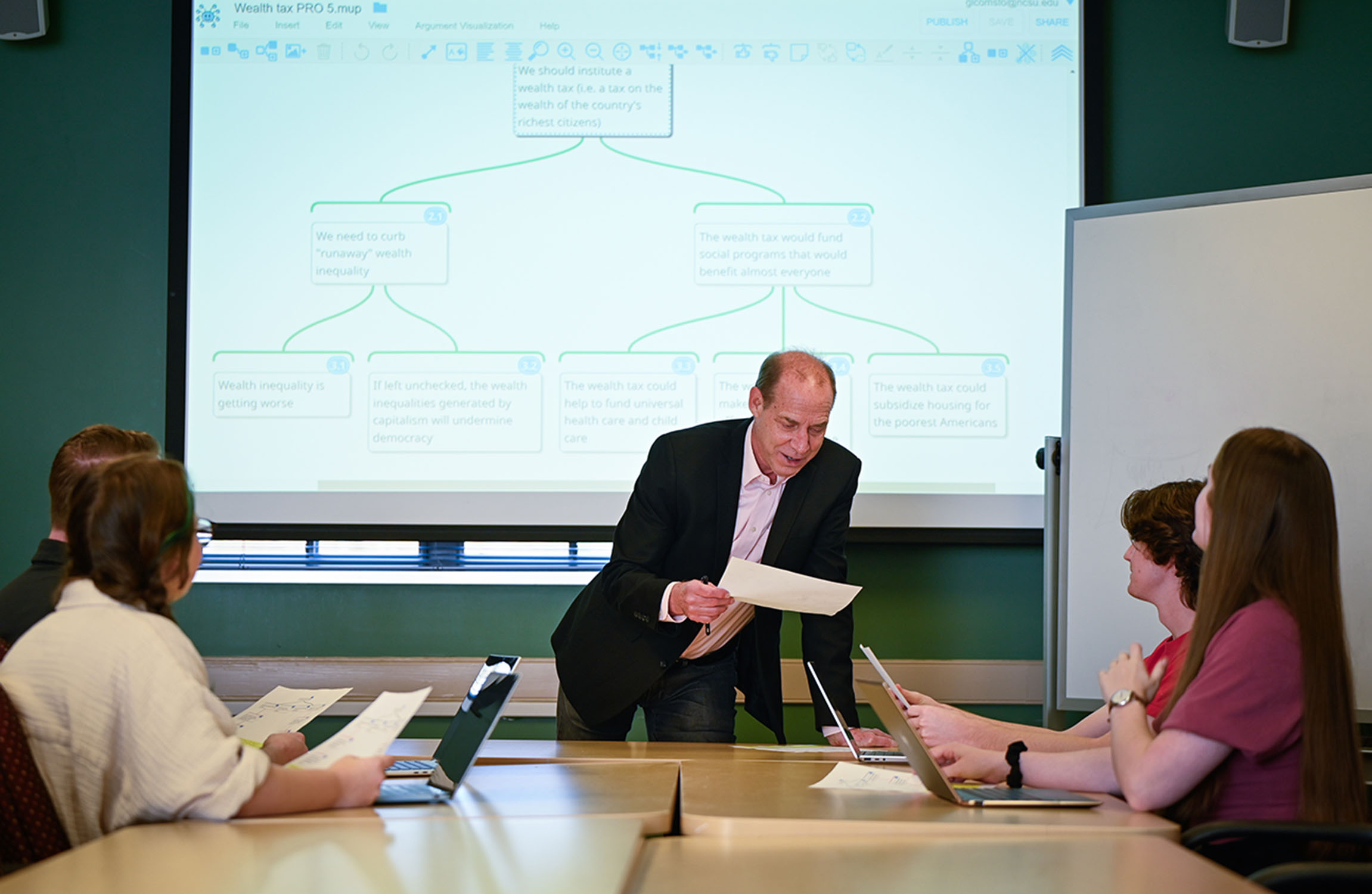Research, Advocacy Lead International Studies Major to the UN

Upon arriving at the United Nations headquarters in New York, Maya Krishnan admits she was a little overwhelmed.
It was the UN’s 60th session of the Commission on the Status of Women, a two-week event that draws prominent dignitaries, politicians and nongovernmental organizations each year. Krishnan, a senior studying international studies and business administration at NC State, was one of only a few student participants.
“You’re walking through these hallowed halls, and there are gender advocates who have been doing this kind of work for years,” Krishnan said, reflecting on her first impressions. “You would lean over, just talking to someone, and find out they are the executive director of a huge NGO or a minister from another country.”
It may have been a lot to take in, but Krishnan wasn’t intimidated. She had done her homework; she was prepared.

Serving as a fellow for the North Carolina advocacy group WomenNC, Krishnan not only gleaned valuable information from the various speakers and roundtables, she also shared some of her own insights. As part of a panel of student researchers, Krishnan presented findings from a study she conducted on minority women and political leadership.
She did so well that she was invited to present at another session the next day.
“There is so much power consolidated in the political sphere, and that power has tangible impacts on society,” Krishnan said. “That’s why it’s extremely important to have a diversity of voices at that level.”
Krishnan, an Alexander Hamilton Scholar who is graduating this May, said she got interested in women’s and gender studies through her humanities major — a degree she didn’t initially plan on pursuing in college.
Krishnan was originally interested in environmental science before transitioning to pursue business administration. She liked the business path, but still felt like something was lacking. After taking an introductory course in international studies, she knew she had found the missing link.
“Those classes have really forced me to make connections — connections that I’m using so much right now,” Krishnan said. “I used that experience at the UN, for example.
“I didn’t feel like I was lost when I was there, and it’s because this major encourages interconnection across degrees and across learning,” she added. “I don’t think that happens in any other college like it does here.”
International Studies professor Seth Murray sent Krishnan information for applying to the WomenNC fellowship, a program launched by the Cary-based nonprofit in 2009. The program sponsors fellows each year from North Carolina universities to conduct research, partner with area organizations and develop recommendations for solutions. The UN conference presentation is the final deliverable of the nearly year-long experience.
I didn’t feel like I was lost when I was there, and it’s because this major encourages interconnection across degrees and across learning. I don’t think that happens in any other college like it does here.
— Maya Krishnan
For her research, Krishnan sought to identify the roadblocks that minority women face in obtaining leadership roles in elected office.
Since 2004, about 27 percent of the nearly 5,000 elected positions across North Carolina have been occupied by women, according to a 2015 report published by Meredith College scholar David McLennan. About 2.3 percent of elected positions have been occupied by women of color, according to the report.
“North Carolina is going through such a demographic shift as a state, one that is not represented at all in politics,” Krishnan said. “That’s something that needs to be addressed.”
After interviewing several elected officials and reviewing existing reports, such as McLennan’s, Krishnan identified two main hurdles minority women face: the financial cost of running a campaign and visibility.
“It’s hard to envision yourself in a space when there’s no one who looks like you,” Krishnan said.

As for her recommendations, Krishnan suggested that the North Carolina General Assembly recruit and place more minority women in its internship program in the executive and legislative branches.
Through her research, she also identified a model organization that aims to flip the statistics on women in politics, Lillian’s List. The Raleigh-based group, which Krishnan partnered with as part of her fellowship, recruits, trains, promotes and supports pro-choice progressive women running for public office in North Carolina.
In the future, Krishnan said she may pursue graduate school. However, for now, she hopes to land a job where she can continue to make a difference.
“This fellowship has reaffirmed that I want to take my career in a direction that advocates gender equality or encompasses some aspect of human rights or social justice,” Krishnan said. “Without that piece, I don’t think I would be satisfied.”


